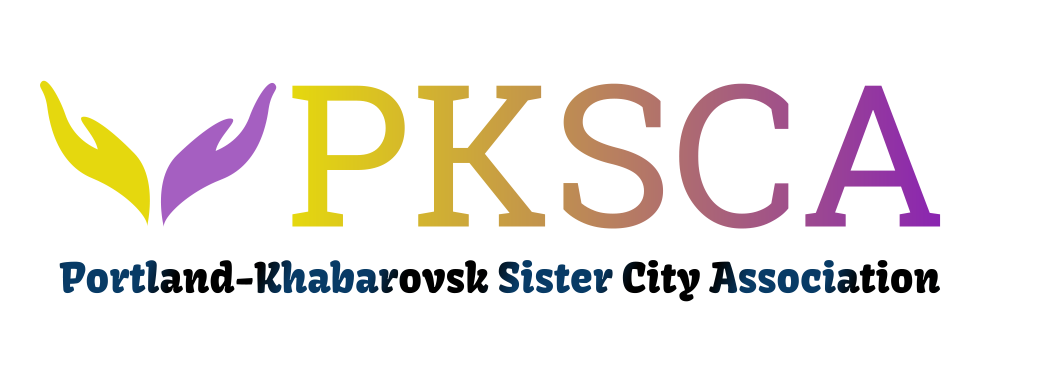PKSCA’s beginnings
2018 marked the 30th year of sister city partnership between Portland and Khabarovsk, and in commemoration of this milestone, PKSCA trailblazers Dr. Earl Molander and Dr. Sandra Freels collaborated on piecing together a “PKSCA History” scrapbook for presentation to the Mayor of Khabarovsk by a visiting PKSCA delegation at the Day of the City Festival in late May of 2018. Though the sister city relationship was not formally inaugurated until 1988, cultural ties between the Oregon Historical Society (Oregon Historical Museum) and the Khabarovsk Regional Museum date back to the late 1970s—with ties between Russia and the U.S. West Coast dating back to the late 18th century…which is where the scrapbook begins.
30-Year Anniversary
Portland-Khabarovsk Sister City Relationship
1988-2018
The Russian colonization of the Americas, 1732-1867
The Russian colonization of the Americas covers the period from 1732 to 1867, when the Russian Empire laid claim to northern Pacific Coast territories in the Americas. In 1725, Emperor Peter the Great ordered navigator Vitus Bering to explore the North Pacific for potential colonization. The Russians were primarily interested in the abundance of fur-bearing mammals on Alaska’s coast, as stocks had been depleted by overhunting in Siberia. Bering’s first voyage was foiled by thick fog and ice, but in 1741 a second voyage by Bering and Aleksei Chirikov made sight of the North American mainland.
Russian promyshlenniki (trappers and hunters) quickly developed the maritime fur trade. In 1784, with encouragement from Empress Catherine the Great, explorer Grigory Shelekhov founded Russia’s first permanent settlement in Alaska. Ten years later, the first group of Orthodox Christian missionaries began to arrive.
In 1808, the former Russian settlement of Redoubt Saint Michael was renamed New Archangel and became the capital of Russian America. A year later, the RAC began expanding its operations to more abundant sea otter grounds in Northern California, where Fort Ross was built in 1812.
By the middle of the 19th century, profits from Russia’s American colonies were in steep decline and the Russians concluded that their American colonies were too expensive to retain. In 1867, the United States accepted Emperor Alexander H’s offer to sell Alaska. The purchase of Alaska for $7.2 million ended Imperial Russia’s colonial presence in the Americas.
Although it may have occurred, regrettably, there is no written evidence of Russian exploration up the Columbia River as far as Portland.

Oregon Historical Society-Khabarovsk Historical Museum Relationship
(1970-present)
In the late 1979s, Thomas Vaughan, Director of the Oregon Historical Society, establishes relations with the Khabarovsk Regional Museum (Khabarovskiy Kraevoy Kraevedcheskiy Muzey im. N.1. Grodekova) to exchange information about the Russian Far East and the Russian colonization of the American West Coast.
Initial Portland-KhabarovskContacts before Formal Relations, 1983-1988.
In 1983, the Portland-headquartered Ground Zero Pairing Projectorganizes a nation-wide program of citizen diplomacy outreach to Soviet citi s fro hundreds of US cities that included an outreach from Portland to Khabarovsk in the form of a package of materials sent from Portland to the City of Khabarovsk Mayor’s office, containing information about Portland, letters from citizens, artwork, and other materials, and an overture to begin a citizen-citizen relationship.
In the spring of 1984, at the height of the Cold War, a package of materials was received in Portland from Khabarovsk. It contained Mischa, the _1980 Olympic mascot, information about Khabarovsk, children’s artwork, and letters from Russian students to students in local schools and Portland State University.

In the summer of 1984, Laurence Kominz, a Professor of Japanese at Portland State University, visited Khabarovsk and conveyed to the city officials Portland’s desire for a formal Sister City Relationship. He returned with an affirmative response from Khabarovsk, but the Portland mayor at the time, Frank Ivancie, refused to pursue a formal relationship with Khabarovsk for political reasons.
In 1987, Joseph Ha, a Professor of International Relations stopped in Khabarovsk enroute back to Portland from Moscow, and met with Khabarovsk officials, who restated to him their desire for a Sister City relationship.
Portland’s new mayor, Bud Clark, responded positively to the overture from Khabarovsk, and the effort to form a formal Portland-Khabarovsk relationship was begun.
Inauguration of the official Portland-Khabarovsk Sister City Relationship, 1988 and formation of the Portland Khabarovsk Sister City Association as a legal organizational entity.
The Portland-Khabarovsk Sister City relationship was inaugurated with an exchange of delegations and the signing of an Agreement in the Summer of 1988.
The Portland-Khabarovsk Sister City Association (PKSCA) was formed June 10, 1988 as a 501(c)(3) non profit organization to foster international friendship through cultural & educational exchange and to facilitate social & economic ties between the citizens of our two communities. PKSCA is a self-governing board operating under a city ordinance which requires us to be both financially independent of and accountable to the Mayor of Portland. PKSCA is entirely dependent on contributions from its members, supportive businesses and organizations, and fundraising events.


